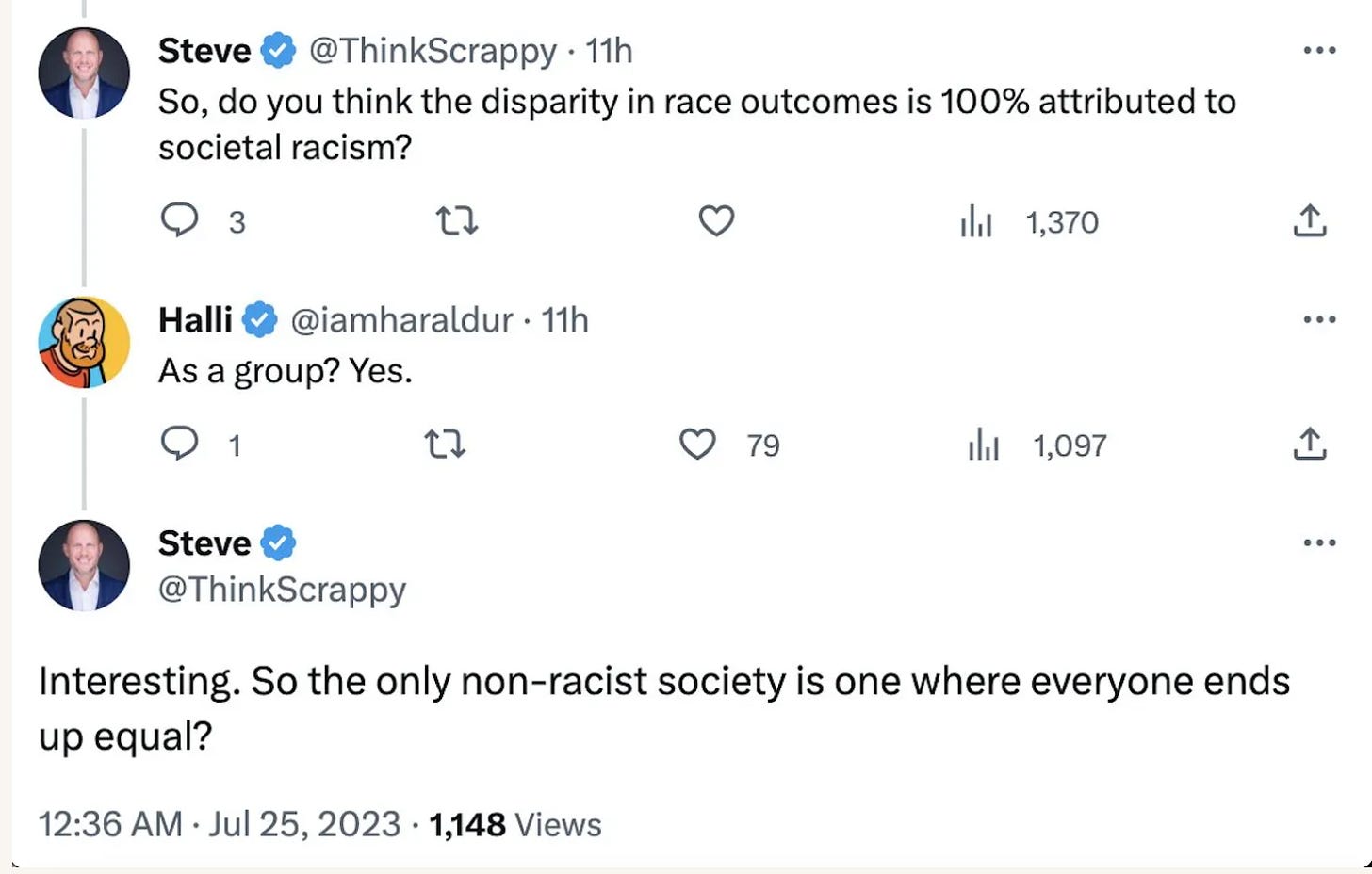Communism with American Characteristics
The similarities between equity-based progressivism and communism
Housekeeping: This week on Moment of Zen, Mike Solana joined to discuss Peter Thiel, the ideal presidential candidate, and the cultural vibe shift. On Upstream we spoke with Sam Hammond about why Thiel was wrong when he said AI is communist and crypto is libertarian. And on Turpentine VC, we spoke with Mamoon Hamid and Ilya Fushman of Kleiner Perkins about why they choose the “craft” approach to VC rather than the “platform” approach.
The success of the movie Oppenheimer is again resurfacing a very interesting issue: Was Oppenheimer a de facto Soviet agent?
What’s fascinating is that most intellectuals were in fact communist back in the day. There’s something about the fantasy of equality and a centrally organized society controlled by technocrats that appeals to academics. I wonder what it is. :)
The part the directors left out of the movie is that Einstein, as Marc Andreessen discussed with Ben Horowitz in their great new podcast, was a Communist and Soviet fellow traveler himself.
This is what Einstein had to say in 1929, on the fifth anniversary of Lenin's death: "In Lenin I admire a man who as thrown all his energy into making social justice real, at the sacrifice of his own person. I do not consider his method practicable. But one thing is sure: Men like him are the guardians and reformers of the conscience of mankind."
Much of the Western intellectual and scientific class of that era were just as radical as the activists on the streets of Portland and Seattle today.
It was that reflection, and this twitter exchange below, that made me want to write about the similarities between between equity-based progressivism and communism, and between equity-based progressivism and classical liberalism.
Yes, I agree with Halli’s original tweet that wokeness is a bastardized word, defined in tons of different ways. In this piece, I’ll define as: prioritizing the reduction of outcome-disparities (i.e. equity) ahead of equal treatment under the law (i.e. liberty), or equity-based progressivism to differentiate it from other forms of progressivism. If you also hate that word, to quote Freddie DeBoer, “please just ****ing say what term I am allowed to use for the sweeping social and political changes you demand”
Equity-based progressivism (or wokeness) has two major differences than communism: it’s about identity rather than class, and it’s decentralized (groupthink/mob) rather than centralized (literally the Kremlin).
What are the similarities between equity-based progressivism and communism?
Well the tweet exchange above specifies it all. If one is using the state to eliminate inequalities between people or groups of people, that’s communism.
Consider this thought experiment: What's the end state where equity-based progressivism would say, "we accomplished our goal, we don’t need more progress?”.
Absolute equality of outcome.
But they’d reply “We won’t get equality of outcome, we’ll get fair, equality of opportunity capitalism, which we’ve never had”.
Motte and bailey. They're already past "equality", they're on to "equity".
Have you noticed? The word? Equity means "equality of outcome".
Of course, you can’t have equality of opportunity without equality of outcome in every dimension. People don’t have the same parents, the same cultures, the same places of birth. If people have different outcomes, they have different opportunities. You can’t equalize opportunity without equalizing outcomes. You can give more opportunities by putting more resources on education, healthcare, poverty reduction etc, but increasing opportunity (good!) isn’t *equalizing* opportunity (bad).
They deny this of course because equality of outcome is politically unfeasible. To be fair to them, they genuinely don't believe they are advocating for it in the first place. In practice it's: "I would never advocate for Marxism, I just advocate for all of the policies that would create and enforce Marxism."
They’d say they do *not* believe in equality of outcome, but they *do* believe in equality of opportunity. But if you think about it for five minutes, those are the exact same thing. Meaning: when the goal is economic "fairness", there's no morally acceptable line until you get to total equality of outcome. You don't just stop & say "OK, we have economic fairness now". You don't just stop & say: "OK, the government is sufficiently powerful". There’s always more work to be done. The work is only competed when everything is equal, otherwise there’s still more progress to make. That’s what progress *is* for them, otherwise they wouldn’t talk about reducing disparities in the first place.
Indeed, for these reasons, there’s no meaningful schism between the equity-based progressives and the economic liberals. There’s perhaps a momentary division but it is quickly overwhelmed by shared goals and shared philosophy. This is also there’s no sizable constituency for "socially progressive, economically conservative". Or "anti-woke and pro-UBI". You're either a radical egalitarian or you're not. If you are, you have to sign up for the whole package, including both the social and the economic package. Otherwise your position is actually philosophically incoherent and you will have no allies and you will get destroyed from both sides.
And of course the only way to achieve complete equality of outcome is a massive expansion of state power.
The anti-woke pro-socialists are just confused. It won't last. The problem with socialism is the exact same problem with equity-based progressivism, just on the axis of economics vs identity. The goal is the same along both axes: equality of outcome. The mechanisms to achieve the necessary goal of equality of outcome are the same. And they naturally reinforce each other because when identity groups are unequal, one of the main ways they are unequal is economic. By which I mean, when the goal is economic "fairness", there's no morally acceptable line until you get to complete equality of outcome. Everything else is unfair. Which is why you can’t just have economic or social leftism, you have to have both. Having one of them is the compromised version, and you can’t beat the pure version with the compromised version.
Why equity-based progressivism is more effective than communism
These two structural differences between equity-based progressivism and communism (decentralized & identity-based, instead of centralized & class-based) actually make this mutated version of Marxism more effective. After all, economic Marxism didn't work because social class isn't a strong enough identifier. Once you get rich, you stop being loyal. And people want to be rich. Also, capitalism provided an alternative vision. So overtime, people saw how rich the west was getting & lost faith.
What's a better identifier? Well, identity. What you can't change. Those are identifiers on which people will always be loyal, no matter how rich they get. And so there's a huge opportunity to capture votes by appealing to those axes. Even when they get wealthy, they'll always be loyal.
What the new Marxists did was stick to the structure: promise high status to lower status people. But they changed the content, adapted to the new era. Now people weren't poor because of class warfare, they were poor because of oppression. The idea spread wildly. Ironically, the capitalists embraced it! Think about how different capitalist response to Occupy Wall Street was vs social protests of today.
Communism lost partly because there was an attractive alternative in the west. At some point Soviet communism became lower status than American capitalism. Equity-based progressivism has no such alternative to point to, so it's hard to discredit it. It's the highest status system in the world.
Equity-based progressivism is less formalized than Communism was, partially because it can't be so explicit otherwise it'd be discredited. But also because a distributed version (e.g. press, universities) is more effective. There’s no central choke point.
This isn’t some abstract connection between equity-based progressivism and communism—there’s a direct line. “Politically correct" was a totally serious Communist term in the early decades of Communism, as was "party line". The "party line" was what was handed down by Moscow, it was what all good international communists had to believe. "Politically correct" was the measure of how aligned you were with the party line. The Communists in the 20s would sit around in Marxist study groups and read the party line and correct each other's politics. It became a joke in the 70's and especially 80's and 90's because of the kind of pinched, prudish hall monitor who kept trying to tell everyone what words to use. But what it actually is is decentralized communism.
Can liberalism exist without turning into far left progressivism?
For those liberals who are saying, no no no, we can be liberal, we don’t have to be communist: aren't we struck by the fact that so many smart American liberals went for communism in the 1920's and 1930's and didn't get really free of it until the 80's (American economics textbooks in the 80's still expected the USSR to surpass the US), and now so many smart American liberals have gone for equity-based progressivism without a second thought? In all seriousness, doesn't that suggest that communism then and equity-based progressivism now aren't violations of liberalism, but rather liberalism taken to its logical conclusions?
If these are battles of illiberalism vs liberalism, why does liberalism not have much stronger defense mechanisms? Why do so many liberals go for the illiberal positions so enthusiastically?
As Thiel says, perhaps liberals today are like the Marxists of decades ago who said “Real communism has never been tried”. We’ll discuss this more in a future piece.





"to write about the similarities between between equity-based progressivism and communism, and between equity-based progressivism and classical liberalism."
Did you ever get around to explaining what is similar between equity-based progressivism and classical liberalism (which I think of too devoted to principles of liberty to fall into a Woke frame)?
I don't think equality of opportunity must be taken to the absurd extreme of equity any more than law and order must be taken to the the absurd extreme of fascism. The problem is not the inherent tendency in the extremes of both, but rather that the left's extreme has been so influential. It hasn't been resisted by the normal left, nor successfully opposed by the right (outside of Rufo recently). Why?